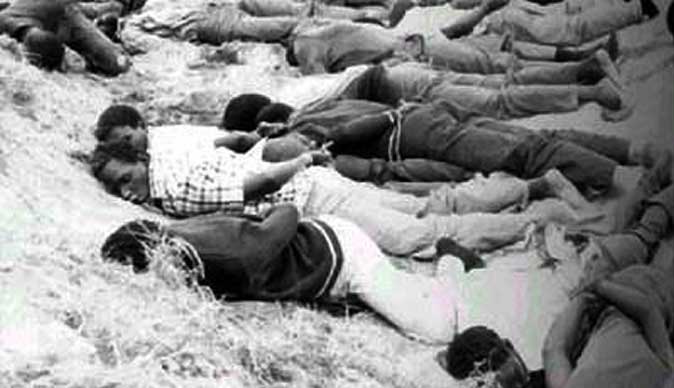
One of President Robert Mugabe’s closest friends, Father Fidelis Mukonori of the Roman Catholic church, says government’s failure to address issues around the 1980s Gukurahundi atrocities in Matabeleland and Midlands is a ticking time bomb and can cause instability in the future.
XOLISANI NCUBE
Writing in his book The Genesis of Violence in Zimbabwe, which was launched by Home Affairs minister Ignatius Chombo on Friday, Mukonori said people in the Matabeleland region were still traumatised by the Gukurahundi killings and failure by government to address the issue would affect generations to come.

“The repressive violence did not only affect individuals, but traumatised the whole community…The affected people still suffer from psychological, economic and physical wounds inflicted by their own government,” writes Mukonori.
“These wounds have not healed despite efforts by government not to open up these wounds. These wounds, if not attended to, are a time bomb.”
The revered priest in his book chronicles the origin of violence in Zimbabwe, tracing it back to the colonisation of Africa.
The book speaks on violence in pre-independent and post-independent Zimbabwe, as well as the recent disturbances in early 2000 due to the mushrooming of a strong opposition — the MDC.
- Chamisa under fire over US$120K donation
- Mavhunga puts DeMbare into Chibuku quarterfinals
- Pension funds bet on Cabora Bassa oilfields
- Councils defy govt fire tender directive
Keep Reading
The government in 1982 launched an army crackdown in Matabeleland and Midlands provinces against dissident elements, resulting in the deaths of over 20 000 civilians, according to a report by the Catholic Commission for Justice and Peace in Zimbabwe.
Mukonori said the issue of the rebels and subsequent reaction from government needed to be explained in “honest by all concerned parties”.
“There is nothing mysterious about the Matabeleland disturbances. People know what happened but they do not want to explain why it happened because of fear,” stated Mukonori in the book published by the Centre for Peace Initiatives in Africa, which he heads.
“Many people that were behind the original cause as to why it happened are still alive. Just as some of the people who participated in the attempt to crush dissidents are still alive, they can tell their story as individuals.”
The book also tackles the after-effects of a state-sponsored clean-up campaign dubbed Operation Murambatsvina that left over 133 534 households and 32 000 small businesses demolished.
In his writings, Mukonori says government should have protected its people and provided for shelter, among other basic needs, as opposed to launching the exercises.
“In practice, the primary responsibility of the state is to protect and provide human security to its citizens and by extension, prevent threats and harm on them. Operation Murambatsvina had a negative effect on Zimbabwe economically, socially, institutionally and politically,” Mukonori said.
Chombo said government was committed to promoting peace and reconciliation, hence the establishment of a department that deals with peace headed by Vice-President Phelekezela Mphoko.
“Despite government’s commitment to amicably address inequalities to curb violence, imperialists have come up with a neo-colonial agenda and imposed policies as conditions for funding,” Chombo said.
“In Zimbabwe, compliance to such demands is tantamount to reversing the gains of the liberation struggle.”
The book launch was also attended by diplomats, Agricultural minister Joseph Made and other church leaders within the Catholic community.
Mugabe described Gukurahundi as a “moment of madness” but has never apologised for the atrocities.











